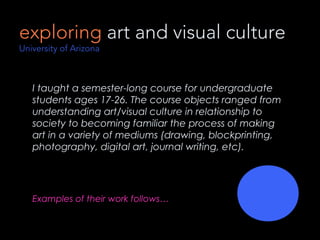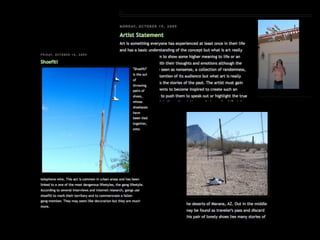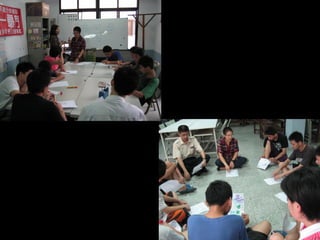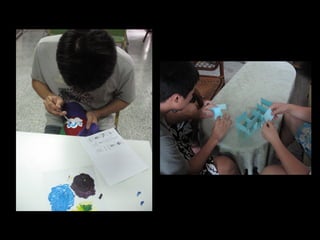Joy Liu - Art Education Overview
- 1. joy liu art educator ooooooo My background is in developing and teaching art, visual culture, and multimedia curriculum and programs for schools and museums in the United States and abroad. I have taught in youth homes, detention centers, prisons, and various youth and community organizations. Aside from teaching art theory and principles, I use art and digital mediums to teach and explore different learning and subject areas such as literacy, life-skills, and social and environmental issues.
- 2. joy liu art educator ooooooo The following slides are brief descriptions of my teaching experiences and examples of student work . Thanks for viewing!
- 3. exploring art and visual culture University of Arizona
- 4. exploring art and visual culture University of Arizona I taught a semester-long course for undergraduate students ages 17-26. The course objects ranged from understanding art/visual culture in relationship to society to becoming familiar the process of making art in a variety of mediums (drawing, blockprinting, photography, digital art, journal writing, etc). Examples of their work followsĪŁ
- 5. block printing theme: social change
- 9. vision and voice: photoblogging theme: why does art matter? Mediums used: - Writing - Photography - Digital Art - Photoblogging
- 13. art, literacy, & life skills diou liou, taiwan
- 14. art, literacy, & life skills diou liou, taiwan I lived and worked in a youth home in rural Taiwan serving boys ages 13-17. I developed and facilitated lessons, activities, workshops and fieldtrips using art, music, and technology to teach life-skills, literacy, and individual expression.
- 18. design away & little voices zeum, san franciscoĪ»s children museum
- 19. design away & little voices zeum, san franciscoĪ»s children museum Design Away and Little Voices are summer camp programs that I developed and taught children ages 5-9. Students explored the elements of art and design from project- based curriculum. In addition, students worked on collaborative artworks and productions.
- 25. photovoice sisterhoods: visitation valley and sunnydale boys&girls club QuickTime? and a decompressor are needed to see this picture.
- 26. photovoice sisterhoods: visitation valley and sunnydale boys&girls club Sisterhoods is a violence prevention group for girls ages 8-12 in two rival, gang neighborhoods. QuickTime? and a decompressor In collaboration with a are needed to see this picture. community organization, I developed and facilitated a 12-week photography, art and multimedia education program for them.
- 27. The goal of Sisterhoods was to build healthy relationships between girls from Sunnydale and Visitation Valley, reduce violent behavior in these communities, and empower girls to articulate and advocate for the needs of their communities through photography and art education.
- 28. These images are examples of their photographic and digital art work taken in their neighborhoods. The text that accompany the images are their personal words
- 31. Kelly, Age 9
- 32. Jasmin, Age 9
- 33. Tiara, Age 11
- 34. In February 20, 2010 the project was showcased in My San Francisco: A Neighborhood Mashup, which featuring a broad spectrum of media produced by young artists affiliated with six local community-based organizations.
- 35. center of creative photography cube-it-up! - teaching activity and tool
- 36. center of creative photography cube-it-up! - teaching activity and tool Cube-it-up! is a fun gallery, museum or classroom activity as well as an interactive teaching and learning tool for participants of all ages. Its aim is to allow participants to explore the fundamental principles and elements of photography through observation, drawing, sculpture, and design. A detailed activity outline, lesson plan and Teaching Aid also accompany the interactive learning tool!
- 38. personal works
- 39. personal works
- 40. personal works Please visit www.joymerryliu.com
Editor's Notes
- Course Objectives ? ? To understand the role of art and visual culture in relationship to culture and to the individual ? ? To understand some of the current issues in the world of art and visual culture ? ? To become comfortable with discussing and writing about issues and ideas in art and visual culture ? ? To become comfortable with visiting art and visual culture exhibitions, museums, and public art sites and with finding meaning from the experiences therein ? ? To become familiar with and experience some of the processes of making art and visual culture
- Course Objectives ? ? To understand the role of art and visual culture in relationship to culture and to the individual ? ? To understand some of the current issues in the world of art and visual culture ? ? To become comfortable with discussing and writing about issues and ideas in art and visual culture ? ? To become comfortable with visiting art and visual culture exhibitions, museums, and public art sites and with finding meaning from the experiences therein ? ? To become familiar with and experience some of the processes of making art and visual culture
- exhibition visit printmaking studio visit exhibition review & artist statement carving and printing group critique Elizabeth Catlet: Inegracion racial en cuba 1962 Alberto Beltran. Dentengamos la guerra
- AIDS Affects Everyone Patricia Cavagnaro & Brittany Wohl
- Funding the Arts Kyla Quick Taylor Rosenthal Healthcare Policy and Reform Brian Rapoport & Evan McKelvy
- Passive Viewer William Brooks & Joshua Gudenkauf
- Course Objectives ? ? To understand the role of art and visual culture in relationship to culture and to the individual ? ? To understand some of the current issues in the world of art and visual culture ? ? To become comfortable with discussing and writing about issues and ideas in art and visual culture ? ? To become comfortable with visiting art and visual culture exhibitions, museums, and public art sites and with finding meaning from the experiences therein ? ? To become familiar with and experience some of the processes of making art and visual culture
- Artists' Statement In conjuring up ways of learning, the human mind begins to think about school and the associated lectures, textbooks, projects, and essays, but rarely is the possibility of art in education considered. While artĪ»s importance manifests itself in a multi-faceted fashion, itĪ»s value to society as a whole is enhanced by its ability to facilitate learning. In particular, photographic artwork of public places can instruct an audience in a range of subjects and phenomena. The photographic collection of the Meinel Optical Sciences building at the University of Arizona was rendered by the artists to depict and chronicle scientific properties of optical illusions such as reflection, movement, light, and crystalline properties. Specifically, we sought out scenes that would clearly demonstrate these properties to the casual observer along with an aesthetically pleasing, artistic flair. Upon the completion of the photo shoot, we were exceedingly delighted with the quality of the images, as they incorporated various fundamental principles of composition while also showing our central theme. Overall, artwork aids in the learning process with a visual presentation of concepts which can pique the interest of those that might not otherwise study a subject. In visually displaying a concept or idea, art can supplements oneĪ»s knowledge of a particular subject in a manner that a textbookĪ»s account cannot reveal. Capturing various photos of the telescope on display, the image we selected for the blog was a relatively easy choice with its clarity of focus and excellent angle. For instance, the photograph entitled Telescopes Perception illustrates the reflective properties of the internal mirrors and lenses as the visible full spectrum of light called Ī░color aberrationsĪ▒ appears at the bottom right of the photograph due to the angle of the sunĪ»s rays. While the scientific properties of lenses and light can be studied mathematically in any physics textbook, the actual observance of this phenomenon remains breathtaking, of which mere words on a page do not do justice to the aura of the image. Thus, artwork further enhances the learning process beyond a textbook as it instructs us about perspective and how the eye sees optical illusions. In addition to art aiding in visual education, it also provides education to laypersons in a subject that they may not otherwise be inclined to study. To demonstrate this function of art, we took multiple photos of the crystal in front of the building, and choose the final photograph based on the outstanding framing and positioning of the elements of composition. Within the photograph entitled Crystalline Structures (View 1), the casual observer astutely notices that crystals exemplify translucent qualities, remain smooth to the touch, and are broken along jagged, lattice structured lines. Thus, artwork (photograph) allows non-science experts to examine the properties of crystals, a subject they would not usually study, broadening their minds with visual media. Rather than presenting the viewer with an overtly technical and mathematical explanation of the molecular structure of crystals, this artwork creates a sense of understanding by means of the physical observations with an individualĪ»s own eyes. Due to artĪ»s ability to help us learn visually, it can broaden oneĪ»s knowledge base, and serves as an indispensible resource to society, demonstrated by the artistic creations in the photo blog Ī«Art Helps Us LearnĪ». Ultimately, after screening through thirty photographs, we opted to utilize nine images in the photo blog that reflected the theme most clearly using accepted principles of art. Often overlooked in place of formalism, beauty, and idea, artĪ»s facilitation of learning cannot be ignored in the consideration of the time honored question: Ī░Why does art matter?Ī▒ In fact, many natural phenomena like optical illusions would be stripped of their splendor and sublime beauty without art.
- Course Objectives ? ? To understand the role of art and visual culture in relationship to culture and to the individual ? ? To understand some of the current issues in the world of art and visual culture ? ? To become comfortable with discussing and writing about issues and ideas in art and visual culture ? ? To become comfortable with visiting art and visual culture exhibitions, museums, and public art sites and with finding meaning from the experiences therein ? ? To become familiar with and experience some of the processes of making art and visual culture
- Course Objectives ? ? To understand the role of art and visual culture in relationship to culture and to the individual ? ? To understand some of the current issues in the world of art and visual culture ? ? To become comfortable with discussing and writing about issues and ideas in art and visual culture ? ? To become comfortable with visiting art and visual culture exhibitions, museums, and public art sites and with finding meaning from the experiences therein ? ? To become familiar with and experience some of the processes of making art and visual culture
- Course Objectives ? ? To understand the role of art and visual culture in relationship to culture and to the individual ? ? To understand some of the current issues in the world of art and visual culture ? ? To become comfortable with discussing and writing about issues and ideas in art and visual culture ? ? To become comfortable with visiting art and visual culture exhibitions, museums, and public art sites and with finding meaning from the experiences therein ? ? To become familiar with and experience some of the processes of making art and visual culture
- Course Objectives ? ? To understand the role of art and visual culture in relationship to culture and to the individual ? ? To understand some of the current issues in the world of art and visual culture ? ? To become comfortable with discussing and writing about issues and ideas in art and visual culture ? ? To become comfortable with visiting art and visual culture exhibitions, museums, and public art sites and with finding meaning from the experiences therein ? ? To become familiar with and experience some of the processes of making art and visual culture
- Course Objectives ? ? To understand the role of art and visual culture in relationship to culture and to the individual ? ? To understand some of the current issues in the world of art and visual culture ? ? To become comfortable with discussing and writing about issues and ideas in art and visual culture ? ? To become comfortable with visiting art and visual culture exhibitions, museums, and public art sites and with finding meaning from the experiences therein ? ? To become familiar with and experience some of the processes of making art and visual culture
- Course Objectives ? ? To understand the role of art and visual culture in relationship to culture and to the individual ? ? To understand some of the current issues in the world of art and visual culture ? ? To become comfortable with discussing and writing about issues and ideas in art and visual culture ? ? To become comfortable with visiting art and visual culture exhibitions, museums, and public art sites and with finding meaning from the experiences therein ? ? To become familiar with and experience some of the processes of making art and visual culture








































